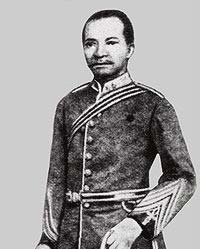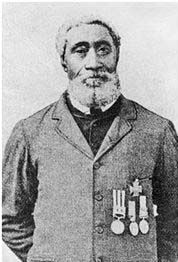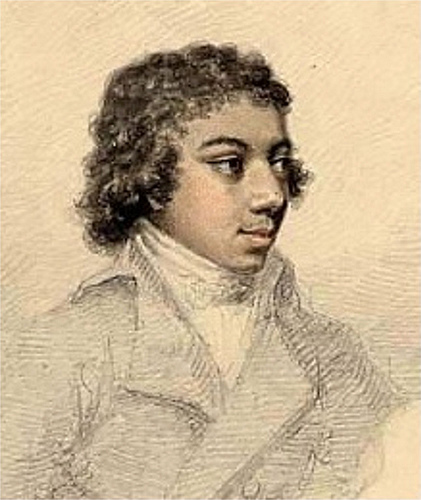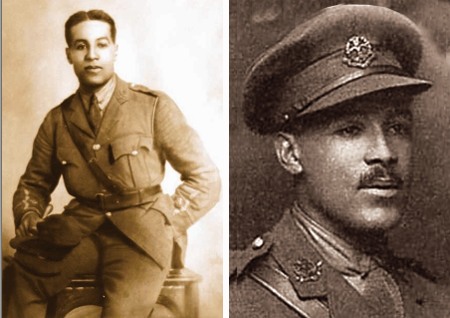Military Service
Despite facing discrimination during their service, many former Black Caribbean servicemen and women and civilian war workers returned to settle in Britain in the first waves of mass immigration from the West Indies during the late 1940s and early 1950s
Military historian John Ellis has identified 41 Black and Asian soldiers who were enlisted with the Royal Worcestershire Regiment between 1751 and 1843. Some of these soldiers may have been the sons of men who had also served the regiment. Thirteen were listed as West Indians, one as African and two as Indians.
Captain John Perkins, a native of Jamaica joined the British Navy in 1775, serving as a pilot. By 1782 he was promoted to the rank of Lieutenant and given command of a Brig. In 1800 John Perkins achieved the rank of Captain. He spent his entire naval career in the Caribbean.
John Sutcliffe Fletcher from Antigua was slave to Vice Admiral Lord Hugh Seymour in Alcester in 1799.
Black workers in the Caribbean built some of the ships that made up the battle of Trafalgar battle fleet. The fleet commanded by Admiral Nelsom on the eve of the Battle of Trafalgar included a significant number of non-European sailors. The records show that some of the crew on Nelson’s flagship were Africans. There were also seamen from the West Indies. Somalis fought alongside Nelson at the Battle of Trafalgar. Born in St Kitts, William Afflick served at the Battle of Waterloo. He later became a Chelsea Pensioner.

 William Hall is noted as the first Black man to be awarded the Victoria Cross. Hall was the son of a freed slave. He was born in Nova Scotia in the year 1827. After joining the Royal Navy on February 10, 1852. He became an able seaman on H.M.S.Rodney, and saw action in the Crimea for which he was awarded Turkish and English service medals. Hall was involved in the 1857 mission to relieve the official British Residency in Lucknow. Along with Lieutenant Thomas Young, Hall was awarded the Victoria Cross for his actions during the Indian Mutiny of 1857. William Hall continued in the Navy before his retirement in 1876. He was promoted to Quartermaster and Petty Officer serving on the ship HMS Peterel. William Hall died at the age of seventy eight at Horton Bluff, Nova Scotia where he has resided since his retirement.
William Hall is noted as the first Black man to be awarded the Victoria Cross. Hall was the son of a freed slave. He was born in Nova Scotia in the year 1827. After joining the Royal Navy on February 10, 1852. He became an able seaman on H.M.S.Rodney, and saw action in the Crimea for which he was awarded Turkish and English service medals. Hall was involved in the 1857 mission to relieve the official British Residency in Lucknow. Along with Lieutenant Thomas Young, Hall was awarded the Victoria Cross for his actions during the Indian Mutiny of 1857. William Hall continued in the Navy before his retirement in 1876. He was promoted to Quartermaster and Petty Officer serving on the ship HMS Peterel. William Hall died at the age of seventy eight at Horton Bluff, Nova Scotia where he has resided since his retirement.

George Bridgetower was a soldier and musician. He made his professional debut in Paris at age of 9. Came to England where the Prince of Wales became his patron. Bridgetower attained a degree at Cambridge University. In 1915 the West Indies Regiment recruited local volunteers to fight overseas. The regimental strength was 15,200, three quarters of which were Jamaicans. Public donation covered the cost of sending the Regiment to France. The Regiment saw action in Palestine, Italy and on the Western Front (the Sahara).
The West Indian Regiment campaigned in the Cameroons, and East Africa and Palestine campaigns in the First World War. The son of a Barbadian born joiner, Walter Tull was born in Folkestone in 1888. He was the first Black officer in the British Army to lead white soldiers into battle. Before the war Tull became the second professional Black footballer in Britain joining Tottenham Hotspurs Football Club in 1909.

Soldiers from Gambia, the Gold Coast (now Ghana), Kenya, Nigeria, Nysaland, Rhodesia (now Zimbabwe), and Sierra Leone were mobilised to protect their borders from possible German incursions. 1,423 soldiers of the Gold Coast Regiment were sent to campaign in East Africa. 137,000 soldiers were conscripted by the French for campaigns in Kamerun, Togo and Europe. Six battalions of Senegalese were shipped to France to fight in the opening weeks of World War 1. In all 163.000 served on the Western Front; 30.000 of them died.
Up to the outbreak of war African soldiers in the British and German colonies were used for domestic security. They were organised to maintain order and had no combat training or experience. They were also poorly armed. African troops in the German colony of Togo were not trained for combat. Their primary function prior to the war was restricted to policing. At the outbreak of the war the troops only possessed rifles previously used in the 1870 Franco-Prussian War.
There were widespread revolts against recruitment in the French African colonies. This resistance came close to ending France’s control in its African territories. Some of the key areas of conflict in Africa saw British and Allied forces fighting to acquire the German colonies of Togo and Kamerun. African troops in the German colony of Togo were not trained for combat. Their primary function prior to the war was restricted to policing. At the outbreak of the war the troops only possessed rifles previously used in the 1870 Franco-Prussian War.
African troops in the German colony of Togo were not trained for combat. Their primary function prior to the war was restricted to policing. At the outbreak of the war the troops only possessed rifles previously used in the 1870 Franco-Prussian War.
Action in Togo concentrated on the defence and capture of the strategically important wireless station at Kamina. The transmitter provided vital communication for German ships operating in the Southern Atlantic. On 12 August 1914 R.S.M Alhaji Grunshi, D.C.M., M.M., may have fired the first shot in the Togo campaign, thus becoming the first shot to be fired by a British soldier during World War 1.
On the 24 August French and British forces converged on the station. Unable to hold the base, the Germans blew up the station and surrendered the following day. The campaign in Kamerun began in August 1914 and continued until 18 February 1916. The Allies principal target was the capture of Duala, a strategically important port. As a deep water port Duala was important to all sides. Besides Duala the Allies also concentrated on taking the port of Victoria, Kamerun’s capital city, Buea and the Benue river port of Garua in the north of the territory. The first British led force entered the north of Kamerun where they suffered an early setback.
On 27 September 1914 the Allies captured Duala. Buea was taken on 15 November 1914. On 10 June 1915 Garua fell to the Allies, but Yaounde in the south of the territory lasted till January 1916 before succumbing to Allied forces. German forces in the northern town Mora moved their camp to a hill above the town. This strategy ensured the garrison held out until 18 February 1916.
Tens of thousands of East Africans were conscripted into the Carrier Corps. The corps was non combatant and provided logistical support for the Allies African campaigns. Just under 29,000 had died by October 1917 from accident or disease.
70,000 Black South Africans were conscripted to the South African Native Labour Corps. Africans served in uniformed Labour Units, providing much needed logistical support to front line troops in African and Europe. On February 21, 1917 the Mendi, a ship sank after a collision in the English Channel. 616 Africans died in the incident.
During the War 367,000 African Americans served in the Armed forces. 130,000 served in France.
Group Captain Larry Osbourne was the first Black man to Reach his senior rank in the RAF.





